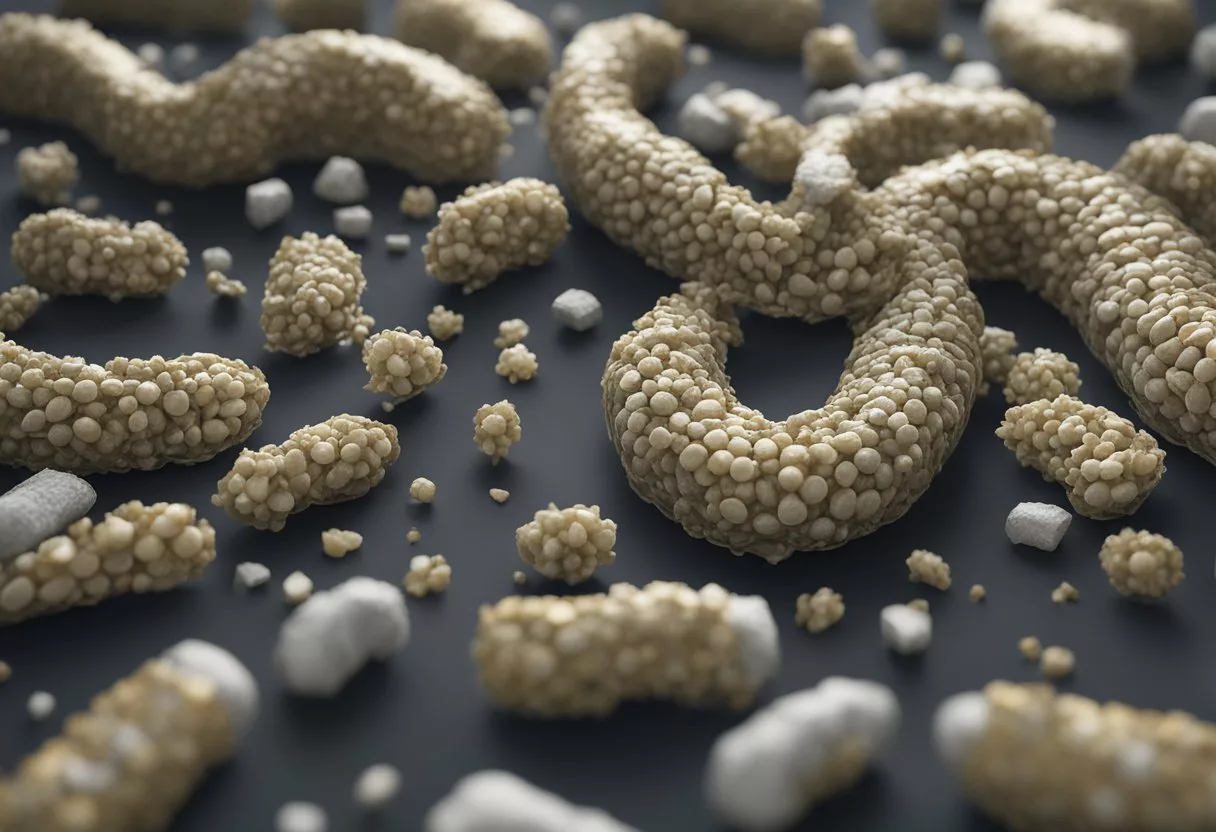Leaky gut, also known as increased intestinal permeability, is a condition in which the lining of the small intestine becomes damaged. This allows undigested food particles, toxic waste products, and bacteria to “leak” through the intestines into the bloodstream.
The integrity of the gut lining is crucial for proper nutrient absorption and maintaining a healthy barrier against pathogens and toxins. Disruptions in this barrier can lead to a host of health issues.

The concept of leaky gut has gained significant attention in both medical and alternative health circles. Scientific evidence suggests that leaky gut could contribute to a variety of conditions, including autoimmune diseases, chronic inflammatory states, and atypical allergies.
While the direct causes of increased intestinal permeability are still under investigation, lifestyle factors and dietary habits are believed to play critical roles in the health of the gut lining.
Key Takeaways
- Leaky gut is characterized by a compromised intestinal lining affecting the immune system and overall health.
- It can contribute to various health issues, including autoimmune conditions and chronic inflammation.
- Management includes dietary changes, lifestyle adjustments, and in some cases, targeted medical treatment.
What is Leaky Gut?

Leaky gut syndrome involves abnormal intestinal permeability which is central to various health concerns, stemming from the importance of the gut barrier’s role in overall health.
Defining Intestinal Permeability
Intestinal permeability refers to the control the intestinal lining exerts over substances passing from the gut into the bloodstream.
Under normal conditions, this permeability is tightly regulated by structures known as tight junctions.
It’s when these junctions are compromised that one might experience leaky gut, a state where the selective permeability is disrupted, potentially allowing harmful substances to pass through.
The Role of the Intestinal Barrier
The intestinal barrier is a crucial part of the immune system and overall health, acting as a gatekeeper to protect the body from pathogens while permitting nutrient absorption.
Consisting of multiple elements, including the intestinal lining and tight junctions, its integrity is vital. Changes to this barrier can influence its function and lead to increased permeability or leaky gut.
Connection Between Leaky Gut and Diseases
A compromised gut barrier has been linked to a host of diseases, with evidence suggesting an association with both intestinal and extraintestinal conditions.
Factors disrupting the intestinal barrier, like inflammation or imbalances in gut bacteria, can exacerbate or result in conditions like irritable bowel syndrome (IBS) or wider systemic issues.
Research to clarify these connections is ongoing, examining intestinal diseases and their direct link to a leaky gut.
Symptoms and Diagnosis

Leaky gut syndrome manifests through a variety of symptoms and requires specific diagnostic approaches to confirm its presence. This section explains the symptoms associated with leaky gut and the methods used to diagnose it.
Recognizing the Symptoms
Symptoms of leaky gut syndrome can be diverse, affecting multiple body systems. They typically include:
- Gastrointestinal Issues: Patients may experience bloating, diarrhea, and constipation.
- Systemic Conditions: These often manifest as chronic fatigue and widespread pain.
It is important to note that such symptoms can also be indicative of other health issues, which necessitates thorough diagnostics.
Diagnostic Approaches
The diagnosis of leaky gut syndrome involves a combination of tests and evaluations:
- Exclusion of Other Conditions: Physicians first exclude other diseases that mimic leaky gut symptoms.
- Intestinal Permeability Tests: These tests assess the passage of substances through the intestinal lining, which can indicate the presence of leaky gut.
- Lactulose and Mannitol Test: This urine assessment evaluates the different rates at which these sugars are absorbed by the gut.
- Zonulin Test: Elevated levels of zonulin protein can signify increased intestinal permeability.
Patients with suspected leaky gut syndrome should consult a healthcare provider to discuss appropriate testing and subsequent treatment strategies.
Causes of Leaky Gut

Leaky gut syndrome refers to the condition where the permeability of the intestinal wall is compromised, allowing substances to pass into the bloodstream improperly. This phenomenon may be influenced by various factors ranging from dietary choices to genetic predispositions.
Diet and Nutritional Factors
A person’s diet has a significant impact on gut health.
Consuming high amounts of sugar and processed foods can damage intestinal barriers, leading to increased permeability.
These diets often lack fiber, which is essential for maintaining a healthy gut lining.
Additionally, the overconsumption of alcohol and dairy can exacerbate the condition, contributing to the deterioration of the gut’s protective functions.
Lifestyle and Environmental Triggers
Lifestyle choices can act as triggers for leaky gut syndrome.
Stress is a prominent factor known to disrupt gut function, while exposure to toxins in the environment can also potentiate gut lining damage.
On top of that, the frequent use of certain medications, including nonsteroidal anti-inflammatory drugs (NSAIDs), has been linked to increased intestinal permeability.
Biological and Genetic Predispositions
Individuals may vary in their susceptibility to develop a leaky gut due to inherent biological and genetic factors.
Age, for instance, is a biological aspect that can affect gut integrity.
Certain health conditions like celiac disease and obesity are often associated with increased risk and can cause chronic inflammation of the gut lining.
In addition to these direct causes, an imbalance of bacteria within the gut, also known as dysbiosis, can further degrade the intestinal barrier.
Associated Conditions

Leaky gut syndrome is implicated in a range of health issues, spanning from localized gastrointestinal disorders to systemic and autoimmune conditions. This association is due to the potential of a compromised intestinal lining to permit the entry of toxins, undigested food particles, and pathogens into the bloodstream.
Gut-Related Health Issues
Patients with irritable bowel syndrome (IBS) and inflammatory bowel disease (IBD), which includes Crohn’s disease and ulcerative colitis, often exhibit abnormal intestinal permeability, commonly known as leaky gut.
In cases of celiac disease, the ingestion of gluten can exacerbate this condition, increasing the gut’s permeability and triggering an immune response.
Autoimmune and Systemic Diseases
Autoimmune diseases such as type 1 diabetes and rheumatoid arthritis have been associated with a leaky gut.
The theory suggests that the leakage of substances through the gut wall may activate the immune system, potentially leading to systemic conditions like chronic fatigue syndrome and fibromyalgia.
Allergies and Intolerances
A leaky gut is also considered a factor in the development of allergies and food intolerances.
It may contribute to conditions like asthma, where the immune system responds to otherwise harmless substances. Furthermore, leaky gut can be connected to skin-related issues, such as acne, due to the systemic inflammation that may arise from gut health disturbances.
Treatment and Management

Effective management of leaky gut syndrome involves an integrated approach that includes both dietary and lifestyle modifications, the use of supplements, and possibly medical interventions, with a focus on reducing inflammation and restoring the integrity of the digestive system.
Dietary Modifications
Individuals with leaky gut are often advised to increase their intake of anti-inflammatory foods such as vegetables and berries, while reducing the consumption of gluten and other potentially irritating substances.
A shift towards a nutrient-rich diet can support the healing of the intestinal lining.
Supplementation and Probiotics
Supplementation with glutamine can aid in repairing the gut lining, as it serves as a key fuel source for intestinal cells.
The inclusion of probiotics through supplements or foods like yogurt, kefir, and fermented foods can help maintain a healthy gut flora, which is essential for a well-functioning digestive system.
Lifestyle Changes
Modifying one’s lifestyle to minimize stress and incorporating regular exercise can positively impact gut health.
These lifestyle changes complement dietary and supplementation efforts by enhancing overall body and digestive system function.
Medical Interventions
When necessary, patients may consult their doctors for appropriate prescription medications to manage symptoms or treat underlying inflammatory conditions.
Medical professionals can offer personalized treatment plans tailored to the individual’s needs.
Prevention Strategies

Maintaining a healthy gastrointestinal system is essential, as it plays a significant role in overall health.
Prevention strategies for leaky gut focus on diet, stress management, and regular health checkups.
Optimizing Diet for Gut Health
Diet is a critical factor in promoting gut health and preventing leaky gut syndrome.
Incorporating a variety of probiotics can aid in balancing gut bacteria, which is crucial for a robust digestive system.
These beneficial microbes are found in fermented foods like yogurt, kefir, and sauerkraut.
A diet high in fiber supports a healthy gut lining and can be increased by consuming fruits, vegetables, legumes, and whole grains.
Additionally, adequate water intake is essential in maintaining the integrity of the gut barrier.
- Fiber-rich Foods: Include apples, almonds, and oats.
- Water: Aim for 8-10 glasses daily.
- Probiotics Sources: Yogurt, kombucha, and pickles.
Stress Reduction Techniques
Chronic stress can undermine digestive health, adversely affecting the gut lining and thus contributing to leaky gut syndrome.
Employing stress reduction techniques can protect the intestinal barrier.
Techniques such as mindfulness meditation, yoga, and breathing exercises can help mitigate the harmful effects of stress on the immune system and gut health.
They should be practiced regularly to manage stress effectively.
- Meditation: Practice for 10-20 minutes a day.
- Yoga: Attend classes or follow online tutorials 2-3 times per week.
- Breathing Exercises: Use deep breathing techniques daily, especially in stressful situations.
Regular Medical Checkups
Routine medical assessments are vital for early detection and treatment of gut-related issues.
Regular checkups can help monitor the health of the gut, liver, and overall immune system functionality.
Healthcare professionals can provide personalized nutrition and lifestyle advice, ensuring the maintenance of optimal digestive health.
- Checkup Frequency: At least once a year or as recommended by a healthcare provider.
- Liver Function Tests: Important for assessing the detoxifying organ that influences gut health.
- Immune System Screening: To check for any underlying conditions that may affect gut integrity.
Leaky Gut Recent Research and Perspectives

Recent advancements in the study of leaky gut syndrome have shed light on the essential role of gut bacteria and the integrity of the intestinal walls.
The following subsections provide insights into cutting-edge scientific studies and evolving hypotheses within the field of gut health, focusing on the interplay between chronic inflammation, nutrient absorption, and molecular interactions that impact overall well-being.
Scientific Studies on Leaky Gut
Recent scientific research has indicated a link between a compromised intestinal barrier and various health issues, including chronic inflammation and autoimmune diseases.
One pivotal study, published on MDPI, proposes that a better understanding of the barrier function could lead to new treatments aimed at fortifying both the gut and brain’s permeability.
Moreover, another evidence-based review highlights the detrimental impacts of a high-fat diet and specific food additives on the gut’s integrity.
Researchers are increasingly focusing on the microscopic changes within gut bacteria and intercellular tight junctions that characterize leaky gut syndrome.
Emerging Theories in Gut Health
The field of gut health is experiencing growth in research exploring the connections between dietary ingredients and intestinal permeability.
An integrative view is considered by a comprehensive review found on MDPI, which identifies nutritional approaches to managing leaky gut syndrome.
Researchers postulate that molecules such as short-chain fatty acids, produced by gut bacteria during fermentation, have the potential to enhance the integrity of the intestinal barrier.
These findings support the theory that personalized nutrition may play a critical role in preventing and treating gut-related disorders.
Frequently Asked Questions

This section addresses some of the most common inquiries regarding leaky gut, providing clear and factual responses based on current knowledge.
What are the common symptoms associated with a leaky gut?
Individuals experiencing a leaky gut may notice symptoms such as bloating, gas, cramps, food sensitivities, and aches.
The complexity of these symptoms often makes leaky gut a condition that requires careful attention.
Which treatments are effective for managing a leaky gut?
The management of leaky gut may involve lifestyle changes and dietary adjustments.
Certain supplements, such as probiotics and glutamine, may also support gut healing, but professional consultation is essential for appropriate treatment.
How can one diagnose a leaky gut without professional medical equipment?
Diagnosing leaky gut syndrome without professional medical equipment is challenging, as specific tests, like the lactulose-mannitol test, are typically conducted by healthcare professionals.
Observing symptoms and response to dietary changes can provide clues but should not replace professional diagnosis.
What dietary changes can help improve a leaky gut condition?
Improving a leaky gut condition can involve dietary adjustments such as reducing intake of irritants like alcohol and gluten and increasing consumption of fermented foods, bone broth, and high-fiber foods to support gut health.
What causes a leaky gut and how can it be prevented?
Leaky gut can be caused by a combination of factors such as poor diet, chronic stress, toxin overload, and imbalance of gut bacteria.
Prevention may include consuming a nutrient-rich diet, managing stress, and avoiding the overuse of antibiotics.
How does one repair their intestinal lining if they have a leaky gut?
Repairing the intestinal lining involves a multifaceted approach.
This approach includes dietary changes, targeted supplements such as L-glutamine, and restoring the balance of gut bacteria through probiotics and prebiotics.
You should work with a healthcare provider to develop a personalized gut-healing plan.